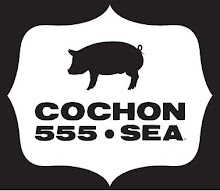Chef Jeremiah Tower, featured in the new documentary, The Last Magnificent
Maverick. Innovator. Disruptor.
Jeremiah Tower is all of those things.
He was the darling of the America culinary scene, pioneering the concept of the star chef. Before Tower, chefs were nameless, and stayed in the kitchen. His San Francisco restaurant Stars broke the mold, and changed the industry with an open kitchen, blurring the line between food and entertainment.
How did a wealthy kid become an icon and celebrated chef?
The Last Magnificent from Anthony Bourdain's Zero Point Zero Productions takes a deep dive into the arch of Jeremiah Tower's life. His story deserves to be told. And it has all the marks of a beautiful balanced film, until the fourth act. At that point, who threw who under the bus, is a matter of debate.
But first, a bit of backstory.
Jeremiah Tower's family had wealth and privilege few can imagine. Bourgeoisie, whose wealth was derived from movie sound systems industry, they traveled around the world, kids in tow. Woefully neglected as a kid, Tower entertained himself, eating his way through five-star hotel menus. Normal kids play baseball and join the cub scouts, Tower collected elegant menus and learned to read French.
Fine food and loneliness.
His story is told in three main segments: early life, his first restaurant job that ended up putting Chez Panisse on the map, and Stars.
You know about Stars in San Francisco? For years, it was the top grossing restaurant in America and THE place to be seen for celebrities and socialites. The restaurant had an all-star roster of cooks too--everyone from Mario Batali to Dominque Crenn and Emily Luchetti. As a ground-breaking restaurant, Stars is noted as the birthplace New American Cuisine, California Cuisine, and the rise of the Celebrity Chef.
And somewhere after that, things went to shit, and so does the film.
It's a jumbled mess of a story, but Stars' demise came from a number of epic factors. The San Francisco earthquake in 1989. Expansion into other restaurants, which meant the celebrity chef was pulled away from being the star attraction. Then there's a bitter investor dispute. And a lawsuit with a former employee.
At some point, chef jumped ship, leaving everybody asking, "Where is Jeremiah Tower?" He was a shooting star, who, after a wild ride, sought a quiet life and refuge in Mexico. Or so everyone thought.
The Last Magnificent was supposed to have a tidy ending, with this chef who is larger than life, fading into a Mexican sunset. Zero Point Zero crew were headed to film the last bits. Except Tower wanted to delay a couple weeks. All he said was, "Something's come up."
And then Tower threw everyone a curve.
72 year old Jeremiah Tower was coming out of retirement, taking the helm at New York's Tavern on the Green.
The film's director, Lydia Tenagalia, found out about it on Twitter. "We were supposed to be going to Mexico! Now I find out he's in New York." Was this Tower's attempt at a last hurrah? An opportunity to rewrite the failed ending of Stars? Tenagalia felt her stomach churn. "The film was almost done! Do I follow the story? How does it fit in the film? What does this mean?"
The hope was this would be a turn around story for Tavern on the Green, and Jeremiah Tower. But the odds were against them both.
"It became evident that it could be a big part of the story, but creatively, it was a challenge to take those pieces and put it together. In the end, it became a final ball of flames."
Up until this point in the film, I was rooting for Tower. Sure, he rubbed people the wrong way. Innovators are like that. While he shook up the status quo, the film was careful to balance those moments with empathy.
And then came that dreaded curve with Tavern on the Green.
Tower only lasted five months there, and his departure was far from a victory lap we hoped for. And that's where the story went sideways. The balanced empathy in the original 3/4 of the film went out the window.
Fortunately, I had a chance to talk with the director. "The sudden announcement about Tavern on the Green. Do you think he was trying to be sneaky about that?"
"I think there was an impulse to fuck with the end of the story. It was as if he was saying, 'Fuck you guys! I'm not going out like that.'" But Tower's story went awry with Tavern on the Green, specifically. "He picked a huge, iconic restaurant, and dove in."
In a more generous moment, she says that move "speaks a lot about his character. The measure of your life is the risks you take. He's always done that--whether it was successful or whether he failed miserably. It's a part of his character."
"Why do you think that?"
"He's a restless soul and he wants to be challenged, and to challenge others. He didn't want to end the film shuffling along the beach. It ended up being a dramatic illustration of what he's made of."
"Do you think your film was an impetus for making that choice--for him to come out of retirement and have one more moment of glory?"
"He'd say 'no', but I think it's more like, 'I'm going to throw myself into fire and you'll see.' He wanted to show me that even at the age of 72, he still has it. And he does."
"So, what happened?"
"The experience of Tavern showed me that he's the guy. That the restaurant is a holistic experience, but," thanks to the restaurant's meddlesome owners, "it fractured and fell apart because Tower wasn't in control."
In an earlier scene, you see Tower in command of the kitchen, with a big, robust opera playing at full volume. (Tower tells me Rigoletto is is favorite opera.) It's a stark contrast to every kitchen I've ever been in. Tenagalia is quick to note, Tower is a "happy explosion....and yet, he had incredible discipline in the kitchen."
His quest goes well beyond food; it's a "full sensory experience."
And that's how I'll remember him.
In this film, I wonder. Is the man known as The Last Magnificent...giving us all the bird? Maybe so. But then again, to get that close to greatness? Maybe that's what it takes.





